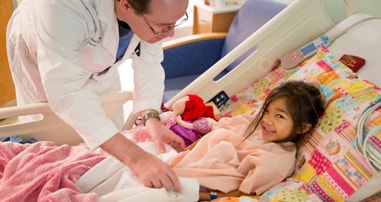The transition years between being a teenager and becoming an adult are exciting but can also present challenges. Adolescents and young adults who have undergone a transplant are confronted with a unique set of stressors in addition to the normal stress that teens face daily. The Teen Transplant Program at Children’s Healthcare of Atlanta is here to help.
The goals of the Teen Transplant Program are to prepare transplant patients to function at their highest potential for independent healthcare management and to transfer them from pediatric to adult healthcare without a disruption in care.
Children’s Provides Full Pre- and Post-Transplant Services for Children in Need of a Liver, Heart or Kidney Transplant.
At Children’s, we are dedicated to providing the resources to help make the transition to adulthood as smooth as possible. Our goal is to provide teen and young adult transplant recipients with the education and experiences that encourage a healthy, successful future in which they function as independent adults.
The Teen Clinic at Children’s is a core component of the Teen Transplant Program. In the Teen Clinic, patients receive developmentally and age-appropriate healthcare services and education from a multidisciplinary team. The multidisciplinary team includes a physician or an advanced practice provider, a nurse, a psychologist, a pharmacist, a nutritionist and a social worker. Each discipline determines what knowledge is necessary for a patient to have in order to transition successfully to an adult healthcare facility and provides the corresponding education.
The multidisciplinary team works closely with patients and families. As patients progress through the Teen Clinic, it is expected that they will develop more knowledge and skills and take on more responsibility for their own healthcare, while parents or guardians will take more of a supporting role in healthcare management.
The Teen Clinic provides:
- More comprehensive, individualized care
- Opportunities for independence—teens and young adults have the option to be seen without their caregivers for clinic visits
- Resources for coping with a transplant
- Age-appropriate healthcare education
- Close collaboration with the Emory Transplant Center, an adult facility
Teen Clinic for liver transplant patients
This clinic is for liver transplant patients ages 14 to 21 who are one year post-transplant. Teen clinics are held in the afternoon on the second and fourth Thursdays of each month in the main Transplant Clinic and monthly using telehealth. This clinic replaces regularly scheduled clinic visits. When patients are ready to transfer to an adult provider, they will have the option of attending the Joint Clinic at the Emory Transplant Center, where they will be seen by an Emory doctor, as well as their Children’s Teen Clinic doctor.
Call 404-785-1807 for more information about the Teen Clinic for liver transplant patients.
Teen Clinic for heart transplant patients
This clinic is for heart transplant patients ages 14 to 21 who are one year post-transplant. Clinics are held in the afternoon on the last Tuesday of each month. This clinic replaces regularly scheduled clinic visits. A tour of the Emory Transplant Center is available for patients who are preparing to transition to this adult facility.
Call 404-785-6395 for more information about the Teen Clinic for heart transplant patients.
Teen Clinic for kidney transplant patients
This clinic is for kidney transplant patients ages 14 to 21 who are one year post-transplant. Clinics are held in the afternoon on the first and third Thursdays of each month in the Transplant Clinic. This clinic replaces regularly scheduled clinic visits. A tour of the Emory Transplant Center is available for patients who are preparing to transition to this adult facility.
Call 404-785-1405 for more information about the Teen Clinic for kidney transplant patients.
Transplant support groups
At Children’s, we also offer many different programs and events to help our patients and families connect with others in the transplant community. Learn more about our events, support groups and camps for transplant patients and their families.
How can I help my teen who has had a transplant?
The need for an organ transplant is difficult for anyone to accept, process and cope with. The emotional and psychological stress impacts all family members.
For teens and young adults who are developing the ability to think in new ways and explore new thoughts, the idea of living with facing a transplantation stimulates concerns and questions about their bodies, relationships and lives. Important factors in helping teens and young adults cope effectively with a transplant experience include:
- Being transparent and honest with your teenage child about his illness and healthcare needs.
- Involving your adolescent in discussions and decision-making about his transplant. Be honest about the benefits and risks involved. This is important to helping him cope with the process and life after a transplant.
- Encouraging your teen to ask questions and to express his fears and feelings about how this affects his life.
- Addressing concerns about death and the possibility of dying. Though difficult to talk about, it is important to address this topic with teens in any life-threatening situation.
- Encouraging hopefulness.
- Using humor when possible, as it helps to reduce stress.
- Having friends visit your child in the hospital and accompany him to clinic visits, when possible.
- Enlisting the help of mental health professionals in addressing fears, feelings and behaviors that are problematic for your teen or other family members.
How can I work with my teen on his transplant medical treatment?
As your teen or young adult learns more about his transplant, he is encouraged to take responsibility for his health and to make his own decisions about his care. As a result, your teen may try decreasing his medication or not taking it without talking to a doctor often happen. While this behavior may be developmentally normal, it may create the need for additional healthcare intervention, as it can lead to the loss of the transplanted organ.
Angry or self-conscious feelings related to having a transplant, or poor judgment in how to cope with feelings, might also affect compliance with recommended treatment or management techniques.
It is important for parents, and healthcare professionals, to help their teen develop emotionally healthy ways of living with his transplant and its management requirements.
Some ways to help your teen cope with the complications may include:
- Encouraging your teen to share his ideas and concerns with healthcare professionals.
- Promoting discussion of what happened rather than reprimanding your teen when his health reaches an unstable state due to noncompliance with medical recommendations. Encourage honest communication about adherence and barriers.
- Teaching the use of problem-solving skills related to his illness by asking questions like, “What do you think you would you do if …?” or “What do you think would happen if …?” Be open with your teen, and don’t be afraid to ask yourself these same kinds of questions.
Seek mental health services if:
- Your teen seems overwhelmed with emotional issues related to his transplant.
- Your teen continues a pattern of noncompliance.
- Your teen’s development regresses or overly dependent behavior continues, or he withdraws from or gives up interest in age-appropriate activities.
Contact Us 800-605-6175




